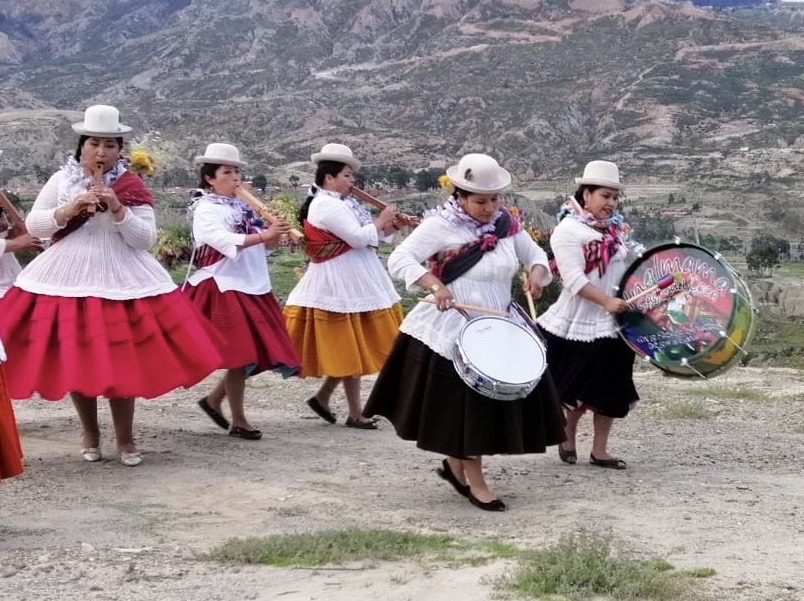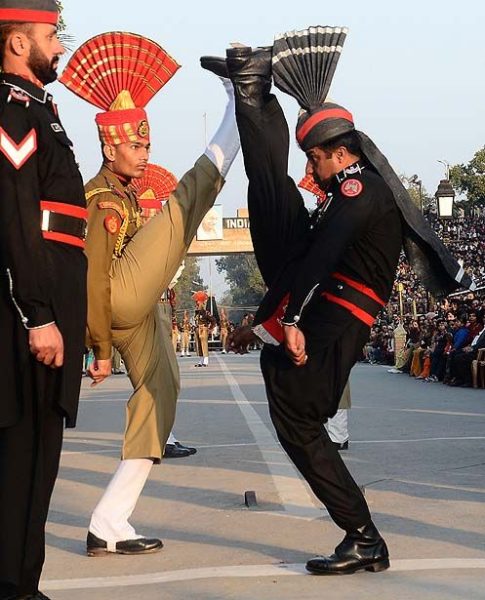The Phusiris women
The Phusiris women: Bolivian musicians challenging social mores
By Marcela Terrile
THEY STRIVE TO BE MASTERS OF THEIR OWN SOUND
Tired of being represented by men, they strive to be masters of their own sound.
All over the world, women are fighting for their rights and their voices are starting to be heard. Without recourse to academic or political speeches, PHUSIRIS women, with dignity and enthusiasm, have made music a space of freedom in which to preserve, develop and spread their culture. Their presence breathes new life into the meaning of their ancestral culture, reconnecting to the past and renewing their true Andean identity.
The Phusiris are Bolivian women from La Paz who play ancestral wind instruments. Their presence is controversial in today’s Bolivia as they are challenging tradition, the social roles given to women as well as Aymara-Quechua myths. Phusiris women who play music are considered transgressors of customs and the social order. Sadly, the urban music scene of La Paz can be sexist, due to contemporary male chauvinism. Faced with such discriminatory attitudes, both visible and concealed, Phusiris women are fighting back using historical fact.
Traditionally, in Aymara-Quechua areas in Eastern Bolivia, women used to play a role in community celebrations by singing, dancing, carrying flags, drumsticks, first aid kits or simply accompanying their husbands. With the arrival of urbanisation and modernity, many women have been forced to abandon any desire to play a wind instrument, even though this social pressure goes against tradition. In response, Phusiris women have been mobilising in indigenous feminist bands, especially in the capital, La Paz. It has not been an easy task, as men have been largely opposed to these changes.
The Phusiris bands that we know today were created in the 90’s with schools playing an important role. Thanks to music lessons at school, women have been able to acquire a certain freedom in choosing which instrument to play, how to play it and when to perform it without being intimidated or challenged by men. Schools have given them the security and confidence to form their own musical identity, through song, customs and other elements that characterise Bolivian traditional culture.
“Blowing” in myth and Aymara tradition
It is a fact that categorisations and roles are socially constructed. The Andean Aymara-Quechua culture is particularly marked by myth and tradition. According to Gerardo Fernández (1995), the act of “blowing” defines gender roles. Fernández points out why, in the Aymara-Quechua culture, a woman should not blow (into a wind-instrument). Referring to the Aymara verb phusaña which literally means “to blow” or “to shoot with violence from the mouth”, the author specifies that by playing wind-instruments, a blow is released into the environment, a blow which, from a woman, could clash with gusts of wind possibly causing a natural disaster.
Women may only blow indoors, more precisely on the “qiri” - a stove made of clay - by using a blower, called “phusaña” (a metal instrument that women use to light the fire in the kitchen stove). In this case, the female blows inside a room, in a private space where she prepares food for the well-being of the family. Thus, she should not blow outside but only indoors where her blow brings life into the family and community and ensures the well-being of all.
In traditional Pacenian [1] families of Aymara roots, there is a myth that women playing wind instruments not only jeopardise their own well-being but also that of their loved ones and community. A woman would put herself at risk; she could become sterile or, if she is breastfeeding a baby, she could stop producing milk or her breast may even burst. At home, the woman who defies superstition by playing a flute risks the wind taking away her family’s good fortune and well-being. And in the community, natural woes are attributed to women who ignore the tradition forbidding them to play a wind instrument.
THE IMPACT OF PATRIARCHAL COLONISATION
There is evidence that before colonisation, the role of women was not restricted to domestic chores or the family home. On the contrary, they used to participate, like men, in important community events.
The colonisation process led by the Catholic Church, especially in the fight against idolatries, has shaped social roles in Bolivia. This mostly affected women priestesses who suffered bans and persecution. They were stripped of positions they were holding in pre-Columbian times.
In addition, the Colony inherited the Roman patriarchal system from the Europeans which affected women in all areas of their lives. Their role became restricted to taking care of the home and family. Furthermore, they were denied access to education, particularly girls from an indigenous background. From the late 20th century, urban life and the opportunity to attend school gave women the chance to improve their circumstances.
BE PROUD OF BEING AN AYMARA-QUECHUA WOMAN AND BLOW INTO ANCESTRAL ANDEAN INSTRUMENTS WHEREVER YOU WANT
TODAY’S PHUSIRIS WOMEN
The arrival of women in a realm exclusively reserved for men led to a new cultural trend, Arawimanta - meaning “people who make art”. In this new social context, on 5th November 1992, some women created the Kalahumana association, whose name was chosen to honour President Andrès de Santa Cruz’s native mother. Female musicians belonging to the association began to perform in theatres and at festivals. Seeing them play wind instruments never fails to amaze the public.
The aim of playing ancestral music is to return to their roots, to their Aymara-Quechua family origins. Transmitting learned memory orally is key to maintaining this cultural link; basically, you listen, watch and practise. Culture and music are a means of making ones identity visible and active in an urban context.
In the last few years, as a new generation emerges, these women musicians are more than ever in the public eye, especially in the La Paz metropolitan area. This social native movement is expanding in Bolivian provinces and also in other countries of the Andes, such as Argentina, Colombia, Chile and Peru.
However, there is still work to be done; we must pay attention and learn from past failures. To realise substantial social change, it is necessary to acknowledge the subtle violence experienced by these women as they strive to keep the tradition of indigenous music alive. It is important to develop strategies to support women as they fight for their rights in a modern, urban context.
It is to be celebrated that today’s Phusiris women fully embrace their important social role, sharing and performing ancestral music from the Andes.
[1] Pacenian is the name given to people from La Paz, capital of Bolivia.
form-idea.com Buenos Aires, 23rd November 2020. Regarding sources, please refer to the Spanish version.
Translated from Spanish by Pierre Scordia and edited by Annie Clein.





Having read this I thought it was really enlightening. I appreciate you taking the time and energy to put this information together. Elissa Rhys
Thank you for this lovely article! I am interested to know where the word Phusiri comes from. What does it mean?
I looked up the etymology of Phusiri in an Aymara-Quechua dictionary and basically it means “the person who blows”. “Phusaña” is the instrument they use to blow on the kitchen stove (“qiri”).